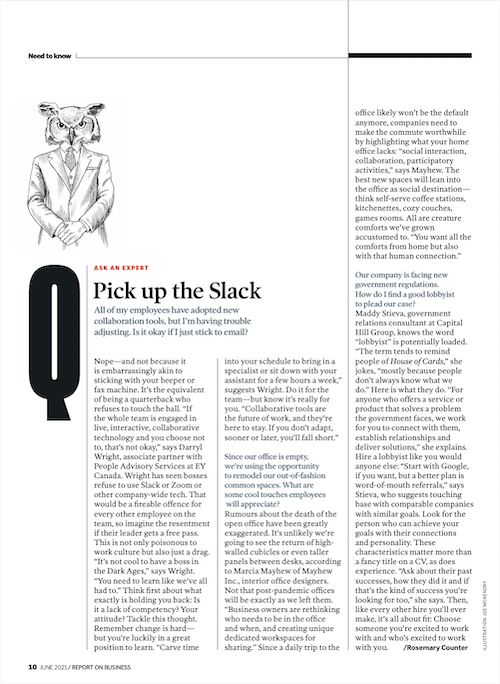Pick up the Slack
Report on Business: Ask an Expert
My employees have adopted new collaboration tools, but can I just stick to email?
Nope—and not because it is embarrassingly akin to sticking with your beeper or fax machine. It’s the equivalent of being a quarterback who refuses to touch the ball. “If the whole team is engaged in live, interactive, collaborative technology and you choose not to, that’s not okay,” says Darryl Wright, associate partner with People Advisory Services at EY Canada. Wright has seen bosses refuse to use Slack or Zoom or other company-wide tech. That would be a fireable offence for every other employee on the team, so imagine the resentment if their leader gets a free pass. This is not only poisonous to work culture but also just a drag. “It’s not cool to have a boss in the Dark Ages,” says Wright. “You need to learn like we’ve all had to.” Think first about what exactly is holding you back: Is it a lack of competency? Your attitude? Tackle this thought. Remember change is hard— but you’re luckily in a great position to learn. “Carve time into your schedule to bring in a specialist or sit down with your assistant for a few hours a week,” suggests Wright. Do it for the team—but know it’s really for you. “Collaborative tools are the future of work, and they’re here to stay. If you don’t adapt, sooner or later, you’ll fall short.”
Since our office is empty, we’re using the opportunity to remodel our out-of-fashion common spaces. What are some cool touches employees will appreciate?
Rumours about the death of the open office have been greatly exaggerated. It’s unlikely we’re going to see the return of high-walled cubicles or even taller panels between desks, according to Marcia Mayhew of Mayhew Inc., interior office designers. Not that post-pandemic offices will be exactly as we left them. “Business owners are rethinking who needs to be in the office and when, and creating unique dedicated workspaces for sharing.” Since a daily trip to the office likely won’t be the default anymore, companies need to make the commute worthwhile by highlighting what your home office lacks: “social interaction, collaboration, participatory activities,” says Mayhew. The best new spaces will lean into the office as social destination—think self-serve coffee stations, kitchenettes, cozy couches, games rooms. All are creature comforts we’ve grown accustomed to. “You want all the comforts from home but also with that human connection.”
Our company is facing new government regulations. How do I find a good lobbyist to plead our case?
Maddy Stieva, government relations consultant at Capital Hill Group, knows the word “lobbyist” is potentially loaded. “The term tends to remind people of House of Cards,” she jokes, “mostly because people don’t always know what we do.” Here is what they do. “For anyone who offers a service or product that solves a problem the government faces, we work for you to connect with them, establish relationships and deliver solutions,” she explains. Hire a lobbyist like you would anyone else: “Start with Google, if you want, but a better plan is word-of-mouth referrals,” says Stieva, who suggests touching base with comparable companies with similar goals. Look for the person who can achieve your goals with their connections and personality. These characteristics matter more than a fancy title on a CV, as does experience. “Ask about their past successes, how they did it and if that’s the kind of success you’re looking for too,” she says. Then, like every other hire you’ll ever make, it’s all about fit: Choose someone you’re excited to work with and who’s excited to work with you.
